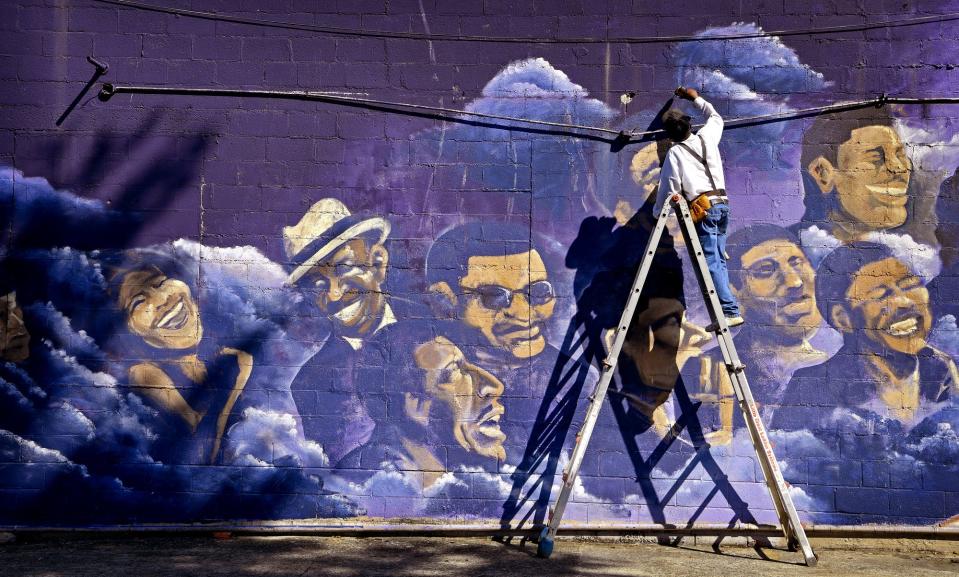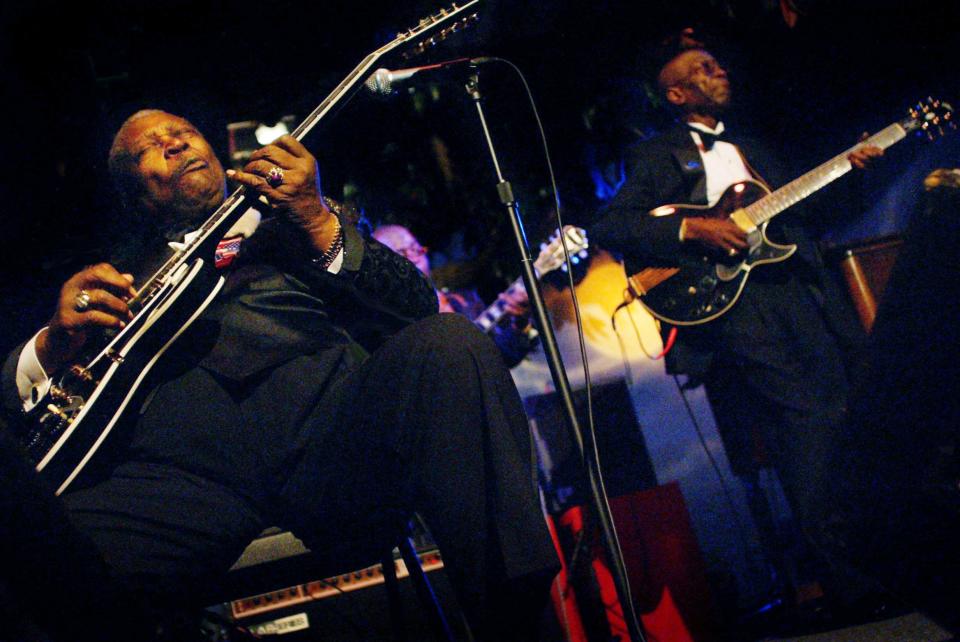CMA Fest is a reminder that Nashville isn't Music City, it's Country Music City
This weekend, Nashville’s downtown streets will be filled with the sound of live music as nearly 100,000 daily attendees take part in this year’s CMA Fest. The four-day event, organized and hosted by the Country Music Association, is a celebration of country music, its creators, and its fans. It’s also a cowboy boot-wearing, three-chord strumming reminder that, as much as Nashville likes to call itself Music City, it is, in practice, Country Music City.
Lots of folks would argue the merits of this inherent truth. I know, because I heard from them when I suggested the city of Nashville step back from its codependent relationship with the notoriously racist and sexist genre. At the very least, the city should demand greater industry inclusion in exchange for the unprecedented, unfettered platform and support it has conferred.
(I also mentioned that the CMA Fest has been granted millions of dollars by Nashville’s Event Marketing Fund, which is administered by the Nashville Convention and Visitors Corp. It is worth nothing, then, that this year’s CMA Fest features two Black stages: one curated by Rissi Palmer, artist and host of the Apple Radio show "Color Me Country," and the other by Holly G of Black Opry. An additional note: The artists on those stages won’t be paid for their performances. None of the artists performing during CMA Fest will be, but the act of requesting free labor in exchange for “exposure” has a more significant impact on Black artists whose income-earning opportunities within the industry are already scarce.)
That said, this column isn’t about CMA Fest, or the millions of dollars that will come pouring into the Country Music Association—and the city—this weekend. Rather, it’s about the money the city won’t earn, and the opportunities lost, because of the lack of equity across Nashville’s live music scene.
How Jefferson Street went from music destination to obliteration
It wasn’t always like this. From the mid-1930s through the mid-60s, Nashville's music scene was a far better embodiment of the city’s moniker. This was largely because of Jefferson Street, the main thoroughfare snaking through an area that's been home to Black Nashvillians since the post-Civil War years.
As 20th century redlining restricted Black residential movement, and segregation dictated where Black folks could eat, shop, and play, Jefferson transformed from safe haven for the newly emancipated to thriving economic center.

Up and down Jefferson, venues hosted Black performers both established and up-and-coming. Etta James recorded her live album, "Etta James Rocks the House," on Jefferson, while a young Jimi Hendrix honed the chops that would turn him into an international superstar.
At the same time, Nashville’s country music industry was a burgeoning thing, trying to find its feet but still trailing far behind R&B and soul in both interest and revenue.
But in Nashville, country music had what those historically Black genres didn’t: municipal support.
Education advocate Sonya Thomas: Nashville public schools have a hidden literacy crisis
With the goal of catalyzing the construction of America’s interstate highway system, President Dwight D. Eisenhower signed the Federal-Aid Highway Act of 1956. The Act stipulated that the federal government would cover 90% of highway construction costs; states would foot the remainder of the bill. Local governments were also responsible for dictating where those roads would be paved, providing a convenient and easy justification for the decimation of Black neighborhoods across the country.
The rest is, as they say, history. Professors from Fisk University and Tennessee State University (then Tennessee A&I) organized a group of Black residents into the Interstate 40 Steering Committee, and a subsequent lawsuit against the highway planners nearly reached the Supreme Court. But despite those valiant efforts, the construction of I-40 obliterated Jefferson Street, the surrounding community, and, of course, Nashville’s Black music scene.
Lovenoise co-founder Eric Holt offers a vision for Nashville Black music
On April 15, Eric Holt, an Assistant Professor of Music Business at Belmont University, stood before a meeting of the Rotary Club of Nashville and spoke to this very issue. Holt is a co-founder of Lovenoise, a platform designed as an urban alternative to the Bluebird Cafe’s country (and decidedly white) songwriting rounds.
What started as a weekly performance platform for local R&B and hip-hop artists ballooned into a showcase for national acts including Nas, Maxwell, and India.Arie. Along the way, Holt established relationships with local venues including Exit/In and Marathon Music Works, but the dearth of Black-owned music spaces always proved a detriment to creating a more sustainable urban music scene in Nashville.
When I spoke with Holt this week, he doubled down on this sentiment.
“When you think about country music, which a lot of the live music industry in Nashville is propped up by, and you look at the consumption rates for the last decade, [country has] never been number-one,” Holt says. “It’s really been third, or fourth, even. So Nashville has done an amazing trick, to create a multibillion-dollar business that’s propped up on something that’s not even mass consumed.
“At the same time, the most consumed music is Black music — hip hop and R&B — and we have a legitimate legacy that’s just as long as, if not longer, than the country music legacy in this town. And we don’t profit from it. We don’t support it. It kinda doesn’t even exist.”
Artists aren’t the only Black creatives impacted by Nashville’s monolithic music scene. Before the Christmas Day explosion of 2020, when dozens of buildings along Second Street were destroyed, B.B. King's Blues Club was one of the only venues in town that regularly hired Black guitarists, keyboardists, and other musicians.
As members of the Club’s house band, those musicians played a mix of R&B, funk, and blues; for tourists and locals alike, they were also the closest representation of what would’ve been heard during Jefferson Street's heyday.

But when B.B. King's was reduced to rubble, and ownership decided not to rebuild, those musicians lost their jobs — as well as their financial stability.
“Could you have a Jimi Hendrix-licensed building, like you have all these other licensed buildings on Broadway?” Holt says. “They’re all country artists, but the history of our city is not just country. The visitors, I would argue, don’t just come to listen to country. So what if we broadened the scope instead of oversaturating with one thing?”
This is typically the point when people mention that Black people aren’t prohibited from opening their own music venues, that Black entrepreneurs could launch their own businesses, just as the owners of Broadway establishments have. I mention this to Holt, anticipating the emails and DMs I’m sure to get from people who’ve only ever known Music City as Country Music City — and who are quite pleased with that reality.
While noting that his ultimate dream is a Black music district that parallels the one on Broadway, perhaps built on Jefferson Street, Holt agrees. But he also refuses to place the full onus for the (re)creation of a Black music scene on Black shoulders.
“There still are some infrastructure issues on Jefferson Street that are there due to city neglect,” he says. “So if you wanted to build a commercial building, to tap into the corroded water lines there in that neighborhood, it costs twice as much as in some of the other neighborhoods. The city can help with that. They haven’t. Even when you look certain developments on Broadway, some of the tax breaks that those companies get, they’re not extending those into the neighborhoods that are majority Black.”
The debate about government investment in the Jefferson Street district isn’t a new one. Shortly after my family moved to the city in 2009, I heard about efforts to revitalize the area that were being led by Eddie George, the former Tennessee Titan who is now the head coach of Tennessee State University’s football team. Those talks, like others since then, reached an eventual impasse.

But Nashville is a different town now. Exponential growth has raised the city’s profile — and, along with it, the cost of living and doing business here. Though the most marginalized Nashvillians felt the squeeze long before that story became national news, the issue has now spread far and wide enough that there may be empathy for those who desire to invest in a historic Black district while requiring some outside assistance.
And if nothing else, the need for Music City’s music to represent all styles still remains.
“It wouldn’t hurt the city,” Holt says. “It would help the city.”
Andrea Williams is an opinion columnist for The Tennessean and curator of the Black Tennessee Voices initiative.
This article originally appeared on Nashville Tennessean: CMA Festival: Don't call Nashville Music City. It's Country Music City
